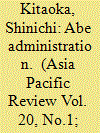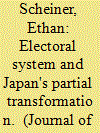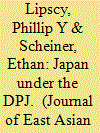|
|
|
Sort Order |
|
|
|
Items / Page
|
|
|
|
|
|
|
| Srl | Item |
| 1 |
ID:
120176


|
|
|
|
|
| Publication |
2013.
|
| Summary/Abstract |
The second Abe administration, inaugurated on December 26, 2012, has been called a repudiation of the Democratic Party of Japan (DPJ) rather than a strong endorsement of the Liberal Democratic Party (LDP). However, in the intervening months, public support has risen. Going forward, the Abe administration faces three serious challenges, namely the economy, security and foreign policy, and a strategy to win in the Upper House elections expected in July 2013. This article analyzes each of these challenges and explores possible courses that the administration could take.
|
|
|
|
|
|
|
|
|
|
|
|
|
|
|
|
| 2 |
ID:
117075


|
|
|
|
|
| Publication |
2012.
|
| Summary/Abstract |
Japan's electoral system, which emphasizes first-past-the-post, single-member district rules, has led the country's party system to become consolidated around the Liberal Democratic Party (LDP) and Democratic Party of Japan (DPJ). At the same time, Japan's electoral rules also made it likely that the two parties would not differ markedly in their policy positions, as well as hinder the emergence of new partisan alignments that could offer more clearly distinct policy options. Put differently, Japan's electoral rules have encouraged the development of what is essentially a two-party system, but one in which party alternation in power need not produce sharp policy change.
|
|
|
|
|
|
|
|
|
|
|
|
|
|
|
|
| 3 |
ID:
117073


|
|
|
|
|
| Publication |
2012.
|
| Summary/Abstract |
In 2009, the Democratic Party of Japan (DPJ) brought an end to the long reign of the Liberal Democratic Party (LDP). However, despite high expectations, this politically transformative event has not unleashed significant policy change in Japan. We highlight five electoral factors that have acted as important constraints on policy change under DPJ rule. First, majoritarian electoral rules have led to a convergence in the policy positions of the two major political parties. Second, as the parties' policy positions have become more similar, voters have increasingly cast ballots based on "valence" (i.e., nonpolicy) evaluations. Third, large national vote swings have limited the tenure of young, inexperienced candidates who might otherwise serve as the instigators of reform. Fourth, Japan's electoral rules permit inconsistency across policy positions within parties and discourage greater policy coherence. Fifth, the continuing influence of rural regions has limited the scope of policy reform under the DPJ.
|
|
|
|
|
|
|
|
|
|
|
|
|
|
|
|
|
|
|
|
|